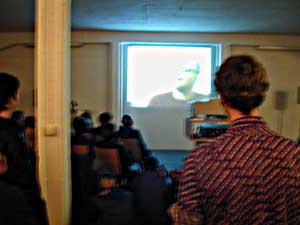Positioning
of the Lüneburg project group
The
exhibition “Border Crossing Services” is the result of a collaboration
between the artists Oliver Ressler and Martin Krenn and a group of students
at the University of Lüneburg. Our contribution to the exhibition
is a video on forms and perspectives of anti-racist resistance and a collection
of critical-analytical texts. These works are based on the theoretical
confrontation with the themes of racism, migration and escape in Ulf Wuggenig’s
seminar on “the construction of the ’other’ in art discourse” and suggestions
about the content made by the artists, who were already involved with this
theme in previous projects.
Initial
ideas for a practical-artistic confrontation with the issue arose from
a group visit to the German-Polish border in Frankfurt/Oder, where we gathered
film material about the specific situation in this city and carried out
conversations with students and lecturers from the Europa-Universität.
We were able to use these experiences to prepare the other interviews that
can be seen in the video, which was conceived and realized entirely as
a group project. It relates thematically to the work from Krenn and Ressler,
but also sets up a specific local connection. Our partners were both the
“Netzwerk gegen Rechts,” which reacts directly to the situation in Lüneburg
– and also members of “Kanak Attak,” a group made up mostly of immigrants
which avoids established forms of identity politics and searches for new
means of anti-racist resistance.

During
the collaborative work with the two artists, it became clear that two aspects
influenced the realization of the entire project. First, the procedural
nature of the piece, i.e. content and form were not prescribed and untouchable
and second, a step by step move away from hierarchies resulted so that
the artists and the participants in the project were able to act as equals
and thereby question and break through commonly assigned roles. Precisely
because the exhibition thematisizes the latent and system dependent dimensions
of racism, a discussion about similar mechanisms in the art context appeared
crucial.
In addition,
we also discussed the possibilities that additional publicity could have
in bringing the theme greater transparency and having more of an effect.
The result of these considerations were plans to realize further events
in the exhibition space to draw in an expanded audience interested in the
theme.
Tina
Dust, Uta Gielke, Maja Grafe, Nina Heiniein, Patricia Holder, Mara Horstmann,
Sarah Kaeberich, Nina Koch, Susanne Neubronner, Astrid Robbers, Stig Oeveraas,
Sabine Zaeske
“Antiracist
Perspectives”
A
Video by the Lüneburg project group

(Transcription
– excerpts from the video)
Kanak*
Attak, Hamburg:
Massimo
Perinelli: Kanak Attak is attempting something new, something that
hasn’t previously existed in the anti-racist area. We are attempting to
work productively with a contradiction, to state on the one hand that we
are carrying out a type of self organization, which means that we, as Kanaken,
are organizing ourselves, as people who are driven into a specific Kanakische
position in Germany according to German relations. On the other hand, we
also state that we are not carrying out identity politics. We don’t understand
ourselves as Turks, Italians or Greeks and have no positive relationship
to that. Therefore, we step away from a certain type of self organization
that existed mainly at the beginning of the nineties. That means, we don't
check passports, and not even those of our members.
question:
Why, then, do you still have the title Kanaken? It sounds as though you
are opposed to every type of categorization – but then you repeat the term
Kanaken. What is the kanakische position?
Perinelli:
We
aren’t opposed to every categorization because categorization exists. We
take it and turn it upside down. We say, we will organize as Kanaken and
understand ourselves as such. Nevertheless, in the end we refuse to explain
what Kanaken are. We can’t set a definition based on blood or culture.
Astrid
Kusser: It is also an attempt to join in the game, but according to
our own rules. I can't imagine a population census that includes the category
“Kanake.”
Perinelli:
We can call ourselves Kanaken. However, I would certainly not let anyone
else call me a Kanake. That something to determine yourself; who you are
at which time, and to take this category into your own hands and turn it
around. We aren't the obedient assimilated immigrants. At the same time
we naturally play with this cliché, these prejudices of what Germans
expect from immigrants – namely, exactly this Kanak-ghetto-gangster-thing.
We use that but make our own story out of it and disappoint expectations.
Vassilis
Tsianos: And it isn’t a reinterpretation either – it is mainly a provocative
appropriation of a form of assigning. This is not only a form of definition,
but at the same time, in the act of its implementation as performance,
it sets a mark of selection which has extremely real effects on those who
are “Kanakisized” as such, and in this way. It points out a paradoxical
situation. The paradox is that, in reality, and that is the good part,
we are not pleading for the inclusion of the category in the census. Precisely
the impossibility of instrumentalizing such a category shows the paradox
of these relations that function in a very real way in daily life: they
create Kanaken and they also create the possibility for Kanakisized people
to position themselves. Moreover, at the same time it is an extreme paradox
because there is no legitimate recourse to legitimate public discourse.
In addition, using this paradox, we are attempting to formulate a pole
where antiracism leaves its defensive position of self organization and
identity politics. We present a solid introduction, or a plea for an offensive
anti-racism: with humor, hedonism and at the same time with the instrumentalization
of all possible forms of medial representation which makes the relations
dance, or at least in terms of categorization. And the rest is politics.
*Pejorative
word in German for a foreigner from the South |